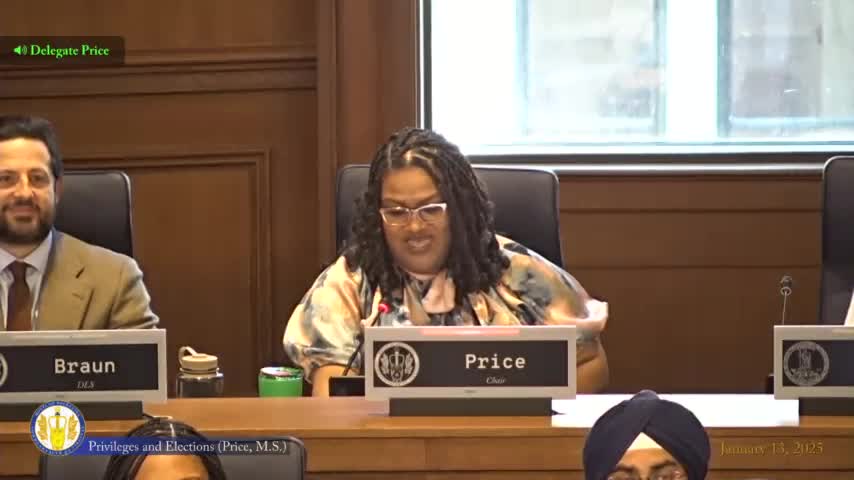Commissioner briefs committee on 2024 elections, Verus upgrade, same‑day registration and USPS issues
Get AI-powered insights, summaries, and transcripts
Subscribe
Summary
Commissioner of Elections Susan Beals told lawmakers about the 2024 election cycle numbers, post‑election survey results, Verus modernization progress, same‑day registration volume, USPS delivery problems, and contingency planning used for Jan. 7 special elections held during a state of emergency.
Commissioner of Elections Susan Beals told the committee that the Commonwealth conducted five elections in 2024 and had about 4.5 million ballots cast, with roughly 48% of voters choosing to vote on election day and 52% voting early in person or by mail.
Beals said the breakdown included about 2.1 million on‑the‑day ballots, roughly 1.8 million early in person and about 400,000 by mail. She said voters used 95,000 drop‑off locations and about 200 ballots were delivered by a designated representative.
Beals reviewed several operational issues that affected the 2024 cycle. Provisional ballots were about 3% of ballots cast—roughly 123,000—largely because of same‑day registration. She said registrars processed about 89,000 same‑day registrations on election day and 25,000 during the early‑voting period, and that many of the same‑day filings were concentrated in college towns where small registrar offices faced heavy volume.
On technology, Beals updated members on the Verus voter‑registration system replacement. She said the contract was awarded in April 2022, planning began in January 2023, and the project has completed 22 development sprints under an agile process. The contract includes about 750 requirements, she said, and she told lawmakers she will not allow a go‑live until testing demonstrates the system meets registrars’ needs.
Beals summarized the post‑election survey of general registrars: 65% reported improved reliability of Verus compared with previous years, and registrars identified staffing and space as their top resource needs. She said the office ran a five‑week voter‑education campaign that produced 91 million impressions and 201,000 clicks to vote.virginia.gov.
Beals described problems with U.S. Postal Service deliveries that registrars reported: 30 localities had late return ballots, 42 had delays getting ballots to voters, 39 reported undeliverable mail, 29 reported ballots without a postmark, 27 lacked IMB (intelligent mail barcode) readability on envelopes, and 32 reported lost ballots. She said election officials had daily contact with USPS during early voting and expected continued coordination for 2025 elections.
On the Jan. 7 special elections, Beals said the governor’s state‑of‑emergency declaration gave the commissioner additional authority to plan for precincts that could not open. The contingency plan asked voters to vote provisional ballots at their registrar’s office if a polling place could not open. The department hand‑delivered supplies to 12 general registrars for that election, and identified 13 polling places that needed targeted plowing; the Virginia Department of Transportation and local officials cleared those routes. Two Powhatan precincts experienced power outages that were resolved by 9 a.m.; eight voters used the registrar office contingency voting process in Powhatan.
Beals thanked registrars, electoral board members and thousands of officers of election for staffing polling places and described local staff sleeping in offices to ensure polls opened. She also noted a large recount earlier in the year—the Fifth Congressional District primary—that involved 24 localities and a statewide effort of risk‑limiting audits conducted the week before Thanksgiving.
Lawmakers raised several questions during the hearing. Delegate Sickles pressed for more detail on the Verus timeline and the office described the agile sprint approach and its emphasis on testing before go‑live. Delegates questioned the department’s list‑maintenance process after names flagged by the Department of Motor Vehicles as potential noncitizens were removed; Beals said the department followed the statutory process in Code § 24.2‑410.1 and declined to comment on ongoing litigation on advice of the attorney general. She noted that same‑day registration remains available to voters who believe they were canceled incorrectly.
Delegates asked about absentee ballot envelopes that had been sealed shut due to humidity and print issues; Beals said registrars accepted ballots after voters taped envelopes shut or issued replacement ballots if voters preferred, and offered in‑person voting where required. She said the envelope problem was a nationwide issue connected to humidity and storm conditions.
On recruiting officers of election, Beals said local registrars reported having what they needed for 2024 but that the larger trend remains concerning: many officers are over 60 and the state must recruit younger volunteers, veterans and students.
Beals said the department will continue after‑action reviews and provide additional data on turnout and registration trends that account for population changes.
